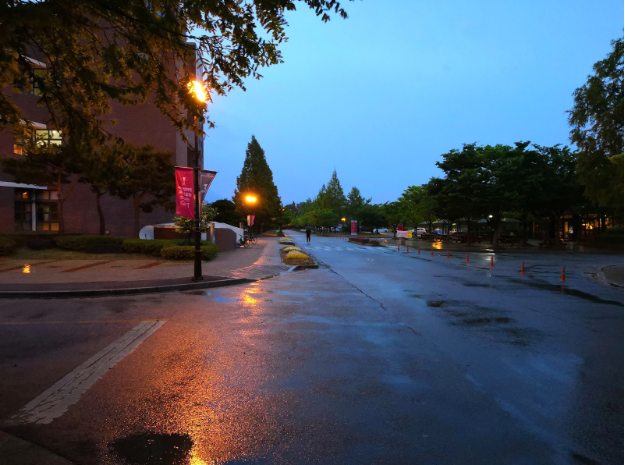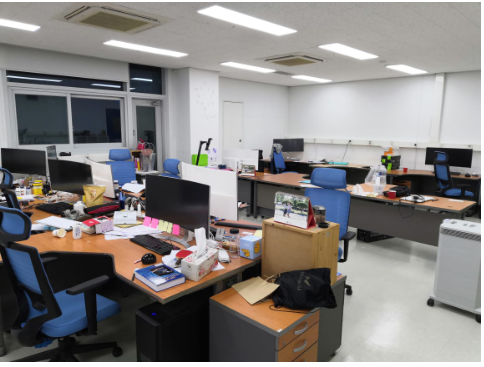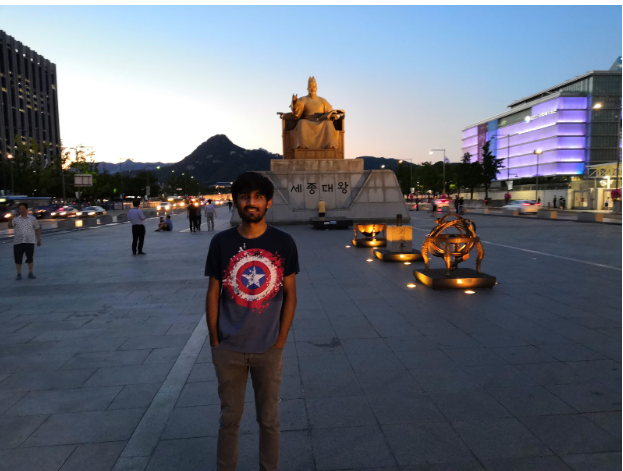

Body of IITR

This summers I interned at the Computer Vision Lab, Gwangju Institute of Science and Technology in South Korea. Given my GPA(marginally above 7) getting a research internship in a specific field(Deep Learning in my case) can get tricky but believe me, it’s worth giving a shot. My interest in Deep Learning was partly inspired by the Deep Learning Book discussion sessions which were organized by Paper Discussion Group(now known as Vision & Language Group/VLG) a group that was initiated by some of my department’s seniors. It was through their advice that I ended up not sitting for campus internships and go all out for a research internship. This proved to be one of the best decisions I took in my college life and all I can say is I’m utterly thankful to them for suggesting me to do so. Although I stopped attending those meetings after my seniors graduated but for juniors who are interested in trying out Machine Learning should definitely consider joining VLG sessions.
The usual ways of getting a research internship are either you get into an already existing research program (MITACS, DAAD, SURF-Caltech, NTU India Connect) or contacting professors directly. These programs usually have a GPA criteria which is near about 8 so I wasn’t eligible for any of them. I went through with emailing professors and also contacting PhDs and postdoctoral researchers through LinkedIn about possible internship positions. The latter helps because PhDs, postdocs and even some professors are active on LinkedIn and can give honest feedback if one’s profile is well suited for the lab and also inform about any such openings available at the first place. This in turn hastens up the process of shortlisting labs and professors to target.
From August to November I emailed a bunch of professors, but didn’t find any success. Parallel to this, in order to strengthen my profile I took up a winter research internship at the Video Analytics Lab, IISc Bangalore and ended up publishing a research paper in a renowned conference through that project. In January, I started applying again, and the research paper seemed to do the trick. I got an offer from Rapid Object Search Lab, Nanyang Technological University(NTU), Singapore. In the interview I was just asked to give a presentation about my previous work and was grilled some very basic machine learning questions. I had another offer from University at Buffalo, State University of New York(UB), the selection process to this involved preparing a presentation on the professor’s research paper that I had mentioned in my email and suggest ways to improve that.
My last offer which I eventually took was from GIST, South Korea. I came in touch with the professor in August on LinkedIn, and had decided to work on a remote collaboration, but I couldn’t keep up with my courses, so I had to drop that. But I kept in touch with the professor discussing research ideas and somewhere around March I inquired about a summer internship opportunity and he agreed to offer me one. The reason for choosing GIST over bigger and better renowned institutions as NTU and UB was that the research topic aligned the most with my interests and the familiarity with the professor.

GIST is part of the government funded tech institutions system in South Korea, it is somewhat similar to what we have in India for IITs. So most of the research funding comes from the government and but also has strong ties with the industry. My lab is part of the Institute of Integrated Technology and the EECS Department.
My project is in the field of Deep Learning and Computer Vision. Specifically I’m working on the intersection of Neural Architecture Search and Binary Neural Networks. Neural Architecture Search is somewhat related to the term AutoML by Google where the goal is to have a single algorithm for finding architectures according to the accuracy and memory requirements for a given task(say image classification). Binary Neural Networks are a class of networks which have weights and activations as binary bits instead of floating point numbers. The project is still ongoing and I’m going to continue it as a foreign BTP here at GIST itself.
I’m working on this project with a South Korean undergrad. The aim of the internship is to publish our work in a top tier conference and also design a directly deployable version of the algorithm for the government institution funding the project. Work hours at the lab are flexible, and a GIST ID card can be used to access the lab and other places anytime of the day. As long as the work is being done, there were no defined hours or compulsions about coming to the lab on weekdays, let alone weekends. I prefer working in the lab, where you can actively discuss ideas with other students as well as the professor which helps you get a better understanding of the field.
The other labmates, who are mostly Masters or PhD students, are very nice and helpful and the same goes for the professor. All the projects including mine are personally mentored by the Professor and we have weekly meetings to discuss the progress and further plan of action. Other than discussions the professor likes having frequent chats which can range from very random chatter like how much he liked 3 Idiots to giving a perspective on academic and industry oriented research, pros and cons of a PhD and similar stuff. All in all, the work environment is relaxed and yet so productive at the same time.
One thing that struck me the most was the niceness of people towards foreigners. Most South Korean people don’t hesitate much before going out of their way to help a stranger despite the language barrier. Other than that if you’re a fried chicken lover, South Korea is the place to be. As per my fellow labmate, Korea has more fried chicken places than the no of McDonald’s in the entire world. The weather is pleasant, neither too hot nor too cold. My institute is in Gwangju, but I also had the chance to visit Seoul for a conference.

I had done a research internship in the past but this internship helped me build a project from scratch and not just coding things for my mentor, which helped me gauge my interest towards independent research. This internship helped me solidify my interest in Deep Learning and gave me a broader perspective towards future options. Also the entire experience of leaving campus internships and exploring a lot of off campus possibilities gave me a sense of confidence that leaving campus opportunities for something that would be more beneficial for me in the long run isn’t that career threatening as some of my peers made it sound and the experience was worth giving a try.
Also I’ve opted for extending this internship as a foreign BTP, which is one of the many academic reforms that were introduced last year. I’ll be shifting the two PECs that I was supposed to take in my 4-1 to my 4-2, and pursue the course BTP-1 in a foreign institute(ie. GIST in my case). I would be evaluated based on my research output and my BTP reports that I would submit to my advisor at the end of the semester. Anyone who is planning to pursue higher studies after college should consider making use of this reform, it would be immensely helpful for your application. For the exact administrative procedures, consider contacting the academic section.
In my not so humble opinion, barely seeing the GPA when the department’s curriculum is not at all related to the research topic is utter foolishness but I guess that’s how most of the academic institutions work and it isn’t changing anytime soon. Although, I strongly recommend to maintain a decent CGPA, but just in case you couldn’t, you can expect a question in almost all your interviews that why do you have bad grades and the best way is to prove that you’ve put your time in developing some skillset which would aid your research.
For freshers’ and sophomores who would be currently wondering of what field of interest they would like to pursue, don’t rule out research with the myth that it has something to do with being good at academics.
Make sure you interact and connect with as many people as you can during your internship, it gives you a broader perspective of options available beyond what you might already know through your IITR seniors or peers.
Getting a research internship is a bit testing, but the experience is definitely worth giving a try. During your hunt for one, be patient and trying weighing more on realistic opportunities and give them your best shot instead of random shots in the dark at anything and everything.
Good luck and hope you make the most out of your summers!